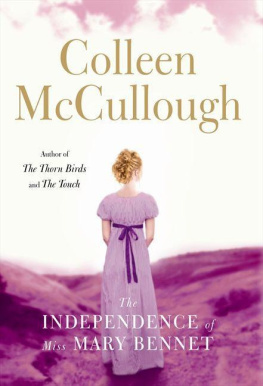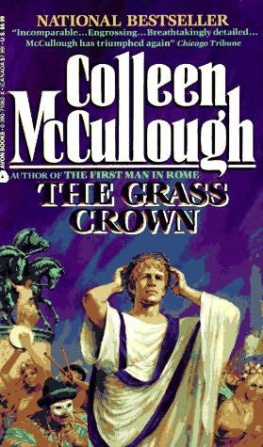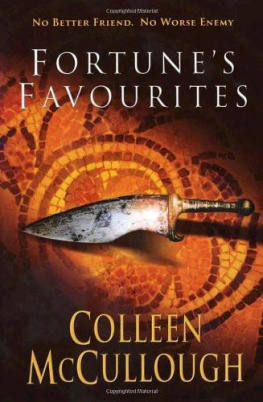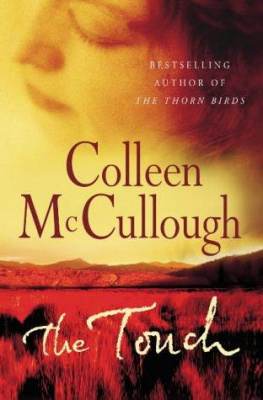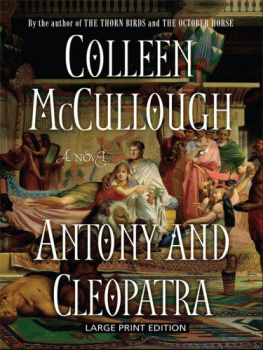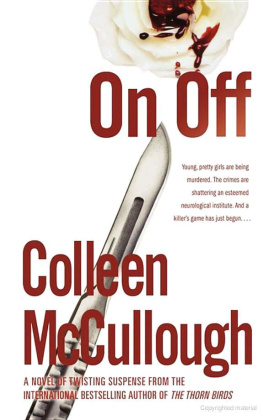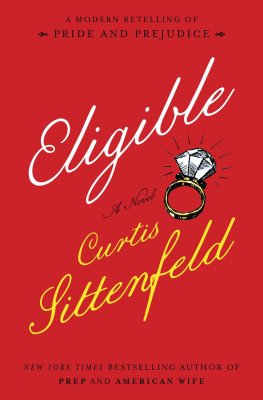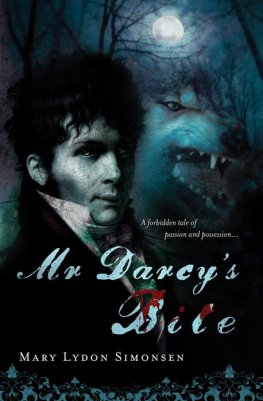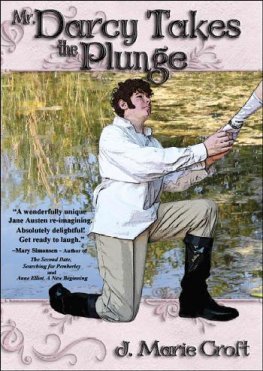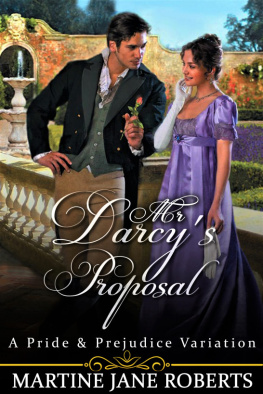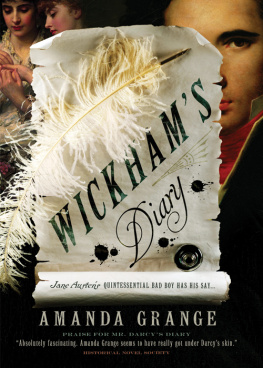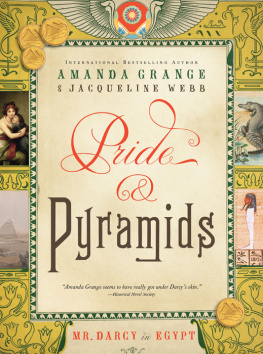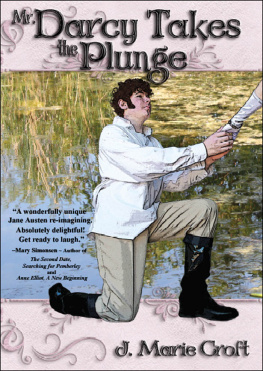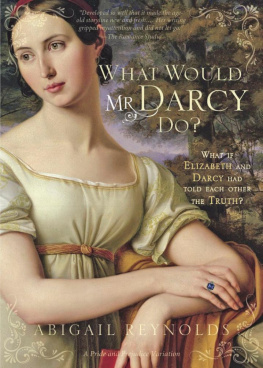The Independence of Miss Mary Bennet
Colleen McCullough
For Bruni
Composer and diva.
As beautiful a person inside
as she is outside.
THE LONG, LATE light threw a gilt mantle over the skeletons of shrubs and trees scattered through the Shelby Manor gardens; a few wisps of smoke, smudged at their edges, drifted from the embers of a fire kindled to burn the last of the fallen leaves, and somewhere a stay-behind bird was chattering the tuneless nocturne of late autumn. Watching the sunset from her usual seat in the bay window, Mary felt a twisting of her heart at its blue-gold glory, soon to be a memory banked inside the echoing spaces of her mind. How much longer? Oh, how much longer?
Came the rattle and tinkle of the tea tray as Martha bore it in; she deposited it carefully on the low table flanking the wing chair in which the mistress of Shelby Manor slumbered. Sighing, Mary turned from the window and took her place, setting a delicate cup in its frail saucer then another for herself. How lucky they were to have Old Jenkins! Still harvesting an occasional cucumber from his frames. And how lucky that Mama relished cucumber slices atop her bread-and-butter! She would wake to see the treats sitting on a sprightly doily, and care not that the cake was three days old.
Mama, tea has arrived, said Mary.
Bundled in shawls and wraps, the little round body jerked; its little round face puckered up peevishly, scowled at being roused. Then the faded blue eyes opened, saw the cucumber atop the bread-and-butter, and a preliminary joy began. But not before the everyday complaint was uttered.
Have you no compassion for my poor nerves, Mary, to wake me so abruptly?
Of course I do, Mama, Mary said perfunctorily, pouring milk into the bottom of her mothers cup, and tilting the fine silver teapot to pour an amber stream on top of the milk. Cooks girl had done well with the sugar, broken it into good lumps; Mary added one of exactly the right size to the tea, and stirred the liquid thoroughly.
All of which occupied her for perhaps a minute. Cup and saucer in her hand, she looked up to make sure Mama was ready. Then, not realising she had done so, she put her burden down without removing her eyes from Mamas face. It had changed, taken on the contours and patina of a porcelain mask from Venice, more featureless than expressionless. The eyes still stared, but at something far beyond the room.
Oh, Mama! she whispered, not knowing what else to say. It came all unaware. She closed those eyes with the tips of her fingers, eyes that somehow seemed to contain more knowledge of life than ever they had during that life, then kissed Mamas brow. Dear God, You are very good. I thank You for Your mercy. How afraid she would have been, had she known.
The bell cord was in reach; Mary tugged it gently.
Send Mrs. Jenkins to me, Martha, please.
Armed with plenty of excuses-what more could the sour old crab ask for than out-of-season cucumber?-Mrs. Jenkins came in girded for battle. But the look Miss Mary wore banished her anger at once. Yes, Miss Mary?
My mother has passed away, Mrs. Jenkins. Kindly send for Dr. Callum-Old Jenkins can go in the pony and trap. Tell Jenkins to saddle the roan, pack his needs and be ready to ride for Pemberley as soon as I have written a note. He is to have five guineas from your jar for his journey, for he must make all haste. Good inns, good hired horses when the roan cannot carry him farther.
Marys voice held its usual composure; no huskiness, no tremor to betray her feelings. For nigh on seventeen years, thought Mrs. Jenkins, this poor woman has listened to her mothers megrims and woes, moans and complaints-when, that is, she wasnt listening to shrill outpourings of delight, triumph, self-congratulation. Saying just the right thing, competently averting an attack of the vapours, jockeying Mrs. Bennet into a better mood as briskly and unsentimentally as a good governess a wayward child. And now it was over. All over.
Begging your pardon, Miss Mary, but will Jenkins find Mr. Darcy at home?
Yes. According to Mrs. Darcy, Parliament is in recess. Bring me Mamas pink silk scarf, I would cover her face.
The housekeeper bobbed a curtsey and left, a prey to many doubts, fears, apprehensions. What would become of them now, from Father to young Jem and Dora?
The scarf properly draped, the fire stoked against the coming night of frost, the candles lit, Mary went to the window and sat on its cushioned seat, there to reflect on more than this visitation from Death.
Of grief she felt none: too many years, too much boredom. In lieu of it, she fastened upon a growing sense of becalm, as if she had been transported to some vast chamber filled by a darkness that yet was luminous, floating on an invisible ocean, not afraid, not diminished.
I have waited thirty-eight years for my turn to come, she thought, but not one of them can say that I have not done my duty, that I have not tipped my measure of happiness into their cups, that I have not stepped backward into obscurity crying one word of protest at my fate.
Why am I so unprepared for this moment? Where has my mind wandered, when time has hung so heavily upon me? I have been at the beck and call of an empty vessel called Mama, but empty vessels hardly ever manage to scratch up an observation, a comment, an idea. So I have spent my time waiting. Just waiting. With a squadron of Jenkinses to look after her, Mama did not need me; I was there as a sop to the proprieties. How I hate that word, propriety! An ironbound code of conduct invented to intimidate and subjugate women. I was doomed to be a spinster, the family thought, with those shocking suppurating spots all over my face and a front tooth that grew sideways. Of course Fitz felt that Mama had to be chaperoned by a member of the family in case she took to travelling to Pemberley or Bingley Hall. If only Papa had not died within two years of Lizzies and Janes weddings!
Think, Mary, think! she scolded herself. Be logical! It was the boredom. I had no choice but to dream the weeks, the months, the years away: of setting foot on the stones of the Forum Romanum; of eating oranges in a Sicilian orchard; of filling my eyes with the Parthenon; of pressing my cheek against some wall in the Holy Land that Christ Jesus must have touched, or leaned upon, or brushed with His shadow. I have dreamed of roaming free along foreign shores, dreamed of sampling the cities of sunnier climes, the mountains and skies I have only read about. While in reality I have lived in a world divided between books, music, and a Mama who did not need me.
But now that I am free, I have no wish to experience any of those things. All that I want is to be of use, to have a purpose. To have something to do that would make a difference. But will I be let? No. My elder sisters and their grand husbands will descend upon Shelby Manor within the week, and a new sentence of lethargy will be levied upon Aunt Mary. Probably joining the horde of nurses, governesses and tutors who are responsible for the welfare of Elizabeths and Janes children. For naturally Mrs. Darcy and Mrs. Bingley enjoy only the delights of children, leaving the miseries of parentage to others. The wives of grand men do not wait for things to happen: they make things happen. Seventeen years ago, Mrs. Darcy and Mrs. Bingley were too busy enjoying their marriages to take responsibility for Mama.
Oh, how bitter that sounds! I did not mean that thought to shape itself sounding so bitter. At the time, it was not. I must be fair to them. When Papa died they were both new mothers, Kitty had just married, and Lydia-oh, Lydia! Longbourn went to the Collinses, and my fate was manifest, between the spots and the tooth. How smoothly Fitz handled it! Shelby Manor purchased together with the services of the Jenkinses, and the fledgling maiden aunt Mary eased into her task as deftly as a carpenter dovetails two pieces of wood. Mama and I removed ten miles the other side of Meryton, far enough away from the odious Collinses, yet close enough for Mama to continue to see her cronies. Aunt Phillips, Lady Lucas and Mrs. Long had been delighted. So was I. A huge library, a full-sized fortepiano, and the Jenkinses.

